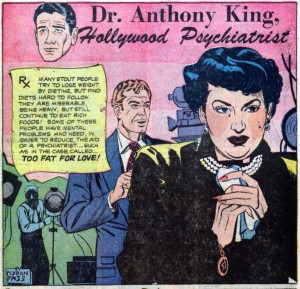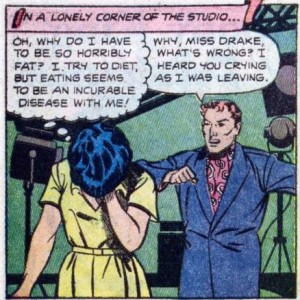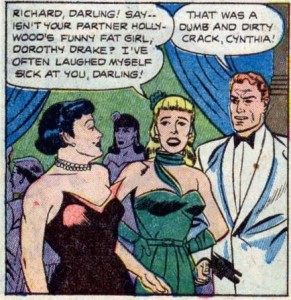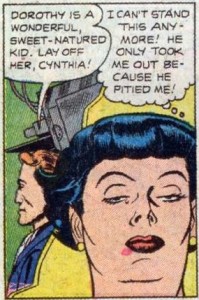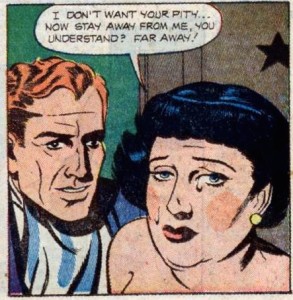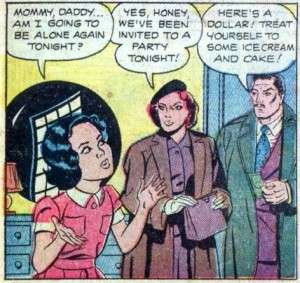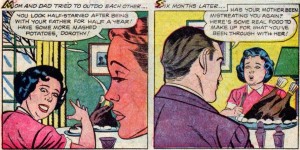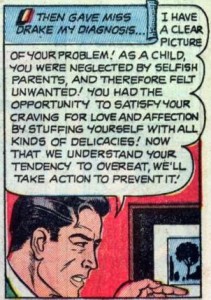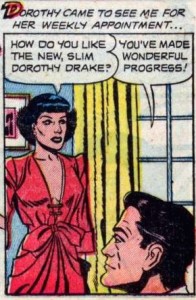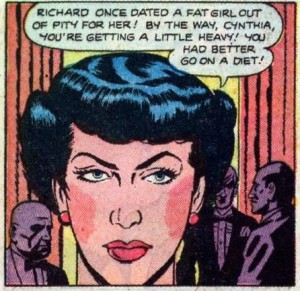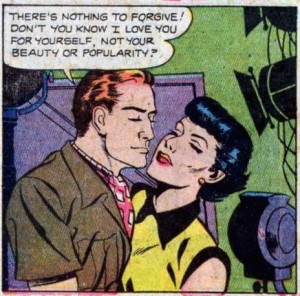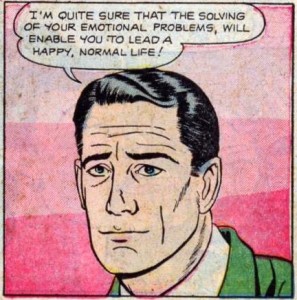Follow Scott
Recent Tweets
- Waiting for Twitter... Once Twitter is ready they will display my Tweets again.
Latest Photos
Search
Tags
anniversary Balticon birthdays Bryan Voltaggio Capclave comics Cons context-free comic book panel conventions DC Comics dreams Eating the Fantastic food garden horror Irene Vartanoff Len Wein Man v. Food Marie Severin Marvel Comics My Father my writing Nebula Awards Next restaurant obituaries old magazines Paris Review Readercon rejection slips San Diego Comic-Con Scarecrow science fiction Science Fiction Age Sharon Moody Stan Lee Stoker Awards StokerCon Superman ukulele Video Why Not Say What Happened Worldcon World Fantasy Convention World Horror Convention zombies
©2025 Scott Edelman
Can “Hollywood’s funny fat girl” find true love?
Posted by: Scott
Tags:
comics
Posted date:
January 14, 2015 |
No comment
We’ve already learned that the protagonist of the 1950 romance comic book story “Too Fat for Love” was required to slim down before finding true love, even though her man said he’d always loved her whatever her size, while the far more enlightened tale, 1949’s “Was I Too Fat to Be Loved?” didn’t demand its heroine lose a pound in order to embrace happiness.
A few years later, another tale on a similar topic—also titled “Too Fat for Love”—appeared in Great Lover Romances #3 (March 1952) and was later reprinted in Dream of Love #9 (1958). Which gives us a third chance to see how old timey romance comics dealt with society’s insistence that only women who maintain a certain idealized body size are deserving of love. (This time courtesy of artist Myron Fass and an uncredited writer.)
The story begins as “famous comedy star” Dorothy Drake takes a pie in the face on the set of her new movie. She hates being the butt of jokes, but knows that at her size, those are the only roles available.
Actor Richard Powers sees how sad her latest scene has made her, and tries to cheer her up by inviting her to a newly opened night club … where actress Cynthia Branson mocks her.
Richard defends Dorothy and takes her home, where he tells her that “you have more charm in your pinkie than Cynthia has in her whole silly torso,” following it up with big goodnight kiss. Which you’d think would be enough to convince Dorothy that Richard likes her. But since we wouldn’t have a story if she believed him, the next day …
… when Dorothy overhears Richard telling Cynthia off, our heroine completely misinterprets the conversation, for no reason that seems to make sense. And when Richard later asks her to lunch, she tells him to get lost. That’s right. He doesn’t dump her. She dumps him.
After this, Dorothy’s starts eating even more, and becomes so miserable she reaches out to Dr. Anthony King, Hollywood Psychiatrist, whose name and face are at the top of the story’s first panel.
Dorothy has heard that “Dr. King helped so many show people in Hollywood.” And don’t worry, he doesn’t do this by handing Dorothy a bag of amphetamines and sending her on her way.
Instead, through talk therapy, Dr. King “learned she was a confused and sensitive girl with a deep need for affection! At the same time, she had a fear of rejection. I felt sure that these reasons were the cause of her excessive overeating.”
And why did she end up that way? He discovers, from delving into Dorothy’s childhood, that her parents gave her food instead of love …
… and once they divorced, her mother and father competed to see which of them could shove more food into her.
After uncovering all this, the doctor makes his diagnosis.
And voilà! Now that Dorothy has received Dr. King’s wisdom, she is suddenly able to maintain a diet and exercise regime.
Which results in her finally being offered a leading role by a studio head, who tells her it occurred because “now … you have gained this new beauty.” Unfortunately, the weight loss also results in her gaining a nasty personality, which comes out when she bumps into Richard and Cynthia at a nightclub, and insults them both.
Richard has no idea what she’s talking about, and tells her, “I never took you out for pity. I thought you were a wonderful person, but I guess I was wrong.” Dorothy doesn’t believe him this time either (once again, for no reason I can see), bringing up and once again totally misconstruing the earlier conversation she’d heard during which he’d defended her.
The air is finally cleared when Cynthia visits Dorothy’s dressing room to tell her what any reader of this story will want to have told Dorothy long before, clearing up the bizarre (and never really explained by the story) misinterpretation and insisting she and Richard were “only good friends.” Dorothy gets it this time, apologizes to Richard, and all is well.
The last word goes to smarmy Dr. Anthony King, who’d have done Dorothy a lot more good had he told her the fat that was causing her trouble was actually between her ears, not on her hips … because as far as I can see, the only thing keeping Dorothy and Richard apart … was Dorothy.
Except that would have ended the comic four pages earlier!
Yet another story in which the protagonist supposedly didn’t have to lose a pound to gain her man, but the writer made sure the plot had her take the weight off anyway.
I hope the next romance comic I encounter on this theme won’t have this mixed a message. So far, though, the odds are running 2-1 against me.

